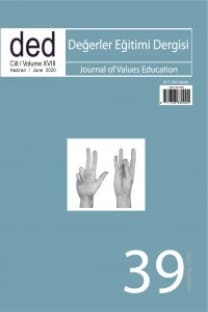Amerika'da Kudüs'ü Kurmak İçin: Mormonlarda Din ve Değerler Eğitimi
Mormonluk ilk ve tek yerli Amerikan dini sayılabilir. Amerika'da değerlerin eğitimi ve yeniden üretimi üzerinde son dönem sosyolojik literatürde toplumsal sermaye kavramının yan-terminolojisiyle düşünülmektedir. Amerika'da bir dinin, görünürde Amerikan karşıtı bir söylemi de olsa, Amerikanizm denilebilecek bir değerler bütününe eklemlenmesi kaçınılmaz olmaktadır. Bu yazıda Mormonlukta din ve değerler eğitiminin değişik mekanizmaları irdelenmektedir. Bu mekanizmalar sadece ilk, orta ve yüksek eğitimdeki kurumsal yapılardan ibaret değildir. Mormonluğun en önemli özelliği din eğitimini hayatın her düzeyine yayma konusunda göstermekte olduğu performanstır. Diğer bir özelliği, yetişen her Mormon'un bir dinsel adanış konsepti içerisinde yetişmesi. Çünkü din Mormonlukta hayatın marjinal veya ikincil bir konusu değil, bizzat hayatın merkezidir. Böyle olduğu için de din eğitimi tamamen din için yaşayan, dinin amaçları ve hedeşerini gerçekleştirmeye adanmış bireyler yetiştirmeye yöneliktir. Kuşkusuz böyle bir eğitimin Amerikanizmin daha genel ideolojilerine eklemlenmesinin de kayda değer yolları vardır ve bu yollar bu yazının konusunu oluşturmaktadır.
Anahtar Kelimeler:
Mormonluk, Toplumsal Sermaye, Din Eğitimi, Değerler Eğitimi, Amerikanizm, Amerikan Dini, Misyonerlik
The Founding of an American Jerusalem: Religions and Values Education Among the Mormons
Mormonism is perhaps the first and only purely American
religion. In recent sociological literature the education in and reproduction
of values in America has been treated using the sub-terminology
of the concept “social capital”. In America, any religion is
inevitably articulated with a set of values that can be labelled
Americanism, even if they have an apparently anti-American emphasis.
In this article several mechanisms of religious and values education
among the Mormons are investigated. These mechanisms are
not limited to institutional levels, such as elementary, middle or high
schools. One of the most important aspects of Mormonism in this
context is perhaps its greater performance in extending the process of
religious and values education throughout life. Another aspect is the
concept through which every Mormon is educated to be religiously
devoted. For religion in Mormonism is not at the margin of life, but
rather at the heart. Therefore, religious education aims at bringin up
generations to live exclusively for religion, and to fulfil the goals and
ends of religion. Undoubtedly, such an education has many noteworthy
ways in which it is articulated with the ideologies of Americanism,
and some of these ways are the subject of this study.
Keywords:
Mormonism, Social Capital, Religious Education, Values Education, Americanism, American Religion, Missionary.,
___
Aktay, Y. (1999). Türk dininin sosyolojik imkanı. İstanbul: İletişim Yayınları.Aktay, Y. (2003). ABD’de din-devlet ilişkileri ve cemaatlerin etkisi. W. Schönbohm. (Ed.), Devlet ve din ilişkileri – Farklı modeller, konseptler ve tecrübeler sempozyumu bildiri kitabı içinde, (ss. 29-48). Ankara: Konrad Adenauer Vakfı.
Averett, K. C. (2000). Personal social networks, social capital, and transition of adolescents into young aduluthood in an LDS population. Unpublished doctorate thesis, Brigham Young University Department of Sociology, Provo.
Bloom, H. (1992). The American religion: The emergence of the post-Christian nation. New York: Simon & Schuster.
Doctrine and Covenants. (1999). Salt Lake City: The Church of the Latter Day Saints.
Fukuyama, F. (1995). Trust: The Social virtues and the creation of prosperity. New York: Free Press.
Heaton, T. B. (1998). Religious influences on Mormon fertility: Cross-national comparisons. In T. D. James (Ed.), Latter-Day Saint social life: Social research on the LDS church and its member, (pp. 105-132). Provo: Brigham Young University Press.
Kara, İ. (2003). Türkiye’de lâiklik uygulamaları açısından Diyanet İşleri. W. Schönbohm. (Ed.), Devlet ve din ilişkileri –Farklı modeller, konseptler ve tecrübeler sempozyumu bildiri kitabı içinde, (ss. 87-106). Ankara: Konrad Adenauer Vakfı.
Mauss, A. L. (1984). Sociological perspectives on the Mormon subculture. Annual Review of Sociology, 10, 437-460.
McKonkie, B. R. (1966). Mormon doctrine. Salt Lake City: Bookcraft.
Moore, L. R. (1986). Religious outsiders and the making of American. New York: Oxford University Press.
Özal, K. (1993). Bir tanık anlatıyor. İstanbul: Milliyet Yayınları.
Patterson, T. E. (1997). The American democracy. New York: The McGraw Hill.
Putnam, R. (1993). The Prosperous community: Social capital and public life. The American Prospect, 13, 35-42.
Putnam, R. (1995). Bowling alone: America's declining social capital. Journal of Democracy, 6 (1), 65-78.
Putnam, R. (1996). The strange disappearance of civic America. The American Prospect, 24.
Rayes, A. L. (1997). Mormonism, Americanism and Mexico. American Behavioral Scientist,40, 902.
The Book of Mormon: Another Testament of Jesus Christ. (1999). Salt Lake City: The Church of the Latter Day Saints.
The Books of the Old Testament. (1999). Salt Lake City: The Church of The Latter Day Saints.
Thomas, D. L. (1983). Family in the Mormon experience: Families and religions. In W. V. D’Antonio (Ed.), Family in the Mormon experience: Families and religions, (pp. 267-88). Beverly Hills: Sage.
Weber, M. (1930). The Protestant ethic and the spirit of capitalism (T. Parsons, Trans.). London: Allen & Unwin.
Yavuz, H. (1998). Mormonlar. Aktüel, 8, 2.
- ISSN: 1303-880X
- Yayın Aralığı: Yılda 2 Sayı
- Başlangıç: 2003
- Yayıncı: Ensar Neşriyat Ticaret A.Ş.
Sayıdaki Diğer Makaleler
Gençliğin Değer Algısı: Konya Örneği
Türk Din Eğitiminde Öncü Bir İsim: Beyza Bilgin
Başkalarının Dünya Görüşlerini Anlama: Din Eğitimine Yorumlayıcı Yaklaşımlar
Din Kültürü ve Ahlâk Bilgisi Derslerinde Kavram Haritalarının Kullanımı
İslâm Eğitim Yaşamında İcazet Geleneği
Bir Eğitim Değeri Olarak Eleştirel Düşünme
Sosyolojik Bir Olgu Olarak Değer
Türk Yönetici Adaylarının, Siyasal ve Dinî Tercihleri ile Yaşam Değerleri Arasındaki İlişki
Amerika'da Kudüs'ü Kurmak İçin: Mormonlarda Din ve Değerler Eğitimi
